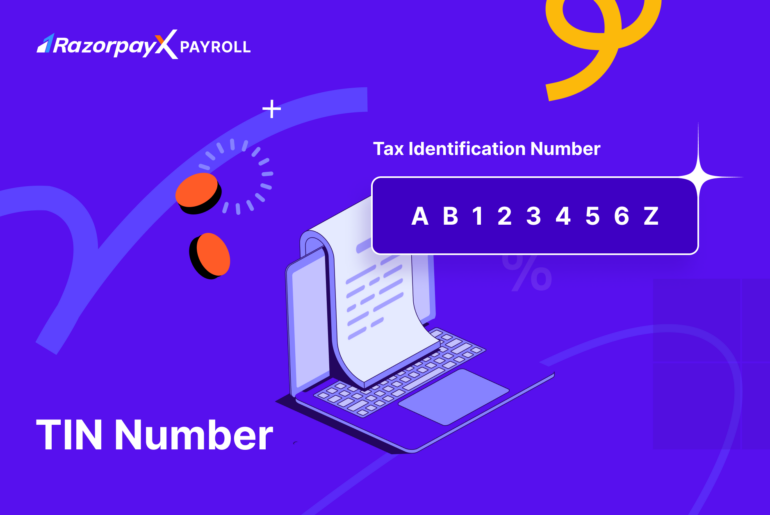Value Added Tax (VAT) is an indirect tax levied on the sale of goods and services in India. Businesses registered under VAT must file regular returns to claim input tax credits. But with countless businesses operating across the country, how do tax authorities track returns, credits, and ensure compliance?
The answer lies in the Taxpayer Identification Number (TIN). This unique identifier allows tax authorities to monitor financial transactions, enforce compliance, and recognize business entities. Understanding TIN is essential for maintaining proper records, effective communication with tax authorities, and claiming credits on time.
Table of Contents
What is TIN in India?
The Taxpayer Identification Number (TIN) is a unique 11-character ID issued to businesses registered under VAT or the Central Sales Tax (CST) regime. The last two characters of the TIN represent the applicant’s state.
Issued by the Income Tax Department, TIN serves as a critical tool to identify taxpayers and ensure adherence to tax regulations.
Who needs a TIN number?
Any business or individual who is involved in the sale or purchase of goods or services in India is required to obtain a TIN number. This includes manufacturers, wholesalers, retailers, dealers, and traders. Additionally, anyone who is registered under the Service Tax Act is also required to obtain a TIN number.
Documents Required for TIN Application
While the exact requirements may vary by state, some common documents include:
- Identity proof
- Address proof
- PAN card of the business owner
- Business address proof
- Proprietor’s passport-sized photograph
- Business incorporation certificate
- For Companies: Memorandum of Association (MoA) and Articles of Association (AoA)
- Security documents or references (if applicable)
Is a TIN the Same as a Tax ID?
You may be familiar with other tax identifiers like the Permanent Account Number (PAN) or the Goods and Services Tax Identification Number (GSTIN). While these numbers also assist tax authorities in tracking compliance and identifying taxpayers, they serve distinct purposes and differ from a TIN.
Here’s a quick comparison of the various tax IDs and their objectives:
| Tax ID | Purpose |
| TIN (Taxpayer Identification Number) | Issued for VAT-related transactions and compliance |
| PAN (Permanent Account Number) | Tracks income tax payments and return filings |
| GSTIN (Goods and Services Tax ID) | Assigned to businesses registered under the Goods and Services Tax (GST) |
| TAN (Tax Deduction and Collection Account Number) | Mandatory for entities responsible for deducting or collecting TDS/TCS on specific payments |
Each tax identifier plays a unique role in ensuring transparency and accountability within India’s tax framework.
How to Apply for a TIN Number in India
Businesses can apply for a TIN either online or offline, as outlined below:
1. Online Method
Follow these steps to apply online for a TIN:
- Visit your state’s Commercial Tax Department or VAT portal.
- Complete the registration form with the required details. Ensure you use the correct portal for your state.
- Attach necessary documents, such as:
- Identity proof
- Business registration documents
- Address proof
- Submit the registration form along with the documents through the online portal.
- The Commercial Tax Department will verify your application.
- Once verified, you will receive your TIN along with a provisional VAT registration certificate.
2. Offline Method
To apply offline, follow these steps:
- Obtain the registration form from your state’s Commercial Tax Department.
- Fill out the form accurately and sign it.
- Attach the required documents to your application.
- Submit the completed package to the designated facilitation center.
- Tax officials will review your application and documents.
- Upon verification, you will receive your TIN and VAT registration certificate.
Why is TIN Important?
TIN is crucial for businesses engaged in VAT-related activities. Here’s why it matters:
- Simplifies Transactions: Facilitates smooth buying and selling of goods/services within and across states.
- Tax Compliance: Enables authorities to monitor VAT-related operations and ensure adherence to tax rules.
- Transparency and Accountability: Promotes a transparent tax system and prevents tax evasion.
TIN is essential for filing VAT returns, claiming input tax credits, and fulfilling other VAT obligations.
Difference Between GSTIN and TIN
Both GSTIN and TIN are unique identifiers used for taxation in India, but they serve different purposes:
- GSTIN is specific to the Goods and Services Tax (GST) regime, which was introduced in 2017.
- TIN, as explained earlier, is primarily used for transactions related to Value Added Tax (VAT) or Central Sales Tax (CST).
While both numbers help streamline tax compliance, their application depends on the type of tax system involved.
TIN Number Search
- Dealers or business entities can sell goods only after obtaining their TIN from the state’s Commercial Tax Department.
- The TIN must be included on every invoice raised and in all communications with sellers.
- The dealer’s TIN can be looked up or verified through the Commercial Tax Department of the state where they are registered.
- TIN verification is an online service that allows users to check a dealer’s or business’s TIN before engaging in transactions.
- To verify a TIN:
- Visit the Commercial Tax Department website of the relevant state.
- Select the “Dealer search” option.
- Enter the TIN number and click the “Search” button.
- The search results will display details such as the dealer’s name, address, licence status, and PAN.
About RazorpayX Payroll
RazorpayX Payroll is India’s ONLY fully automated payroll software that calculates salaries and disburses them directly into employee bank accounts. It also calculates and files taxes like PF, PT, TDS & ESIC.
Some other features of RazorpayX Payroll include:
- Direct salary calculations & transfers to employees, interns and contractors
- Automate filing AND payment of compliances like PT, PF, TDS and ESIC; with challans available for your perusal on the dashboard
- Get support from a dedicated agent in under 30 minutes on live-chat
- Employees declare investments and submit the proof right on the dashboard
- Simplify HR Management from onboarding to exit, powered by Zoho People
- Employees raise instant reimbursement claims and get payslips on WhatsApp
- Exclusive employee insurance plans from Plum at 70% lower costs
FAQs
What is the difference between TIN and GST?
TIN is a tax identification number that is used to identify businesses for tax purposes, while GST is a Goods and Services Tax that is levied on the sale and purchase of goods and services.
Is it mandatory to have a TIN number for small businesses?
Yes, it is mandatory for all businesses, including small businesses, to have a TIN number if they are involved in the sale or purchase of goods or services.
Can an individual apply for a TIN number?
Yes, individuals who are involved in the sale or purchase of goods or services can apply for a TIN number.
Is there a fee to obtain a TIN number?
No, there is no fee to obtain a TIN number. However, some states may charge a fee for the application process.
Can a TIN number be cancelled or deactivated?
Yes, a TIN number can be cancelled or deactivated if the business is no longer operational or if it fails to comply with the tax laws.
Is TIN the same as TAN in India?
No, TIN and TAN are not the same in India. TIN is used for identifying businesses registered under VAT for tax compliance. TAN is assigned to entities responsible for deducting or collecting Tax Deducted at Source (TDS) for income tax purposes. Both serve different roles in the taxation system and cater to distinct requirements.
Is TIN the same as PAN?
No, TIN and PAN are not the same. In India: PAN (Permanent Account Number) is a unique identifier used for various tax purposes, including income tax. TIN (Taxpayer Identification Number) is specifically used for identifying businesses involved in VAT-related transactions.
Can I use My TIN for multiple business registrations across different states?
No, TIN is specific to each state. If you operate businesses in multiple states, you need to register separately and obtain a unique TIN for each state, as per the respective state’s tax regulations.
What are the consequences of failing to obtain a TIN?
If a business fails to obtain a TIN when required, it may face: Penalties and fines for non-compliance with tax regulations. Suspension of business activities until the TIN is acquired. Disruption in tax collection and reporting, resulting in violations of state and central tax laws.





